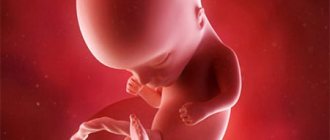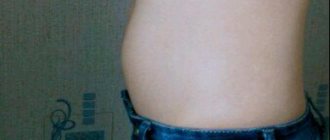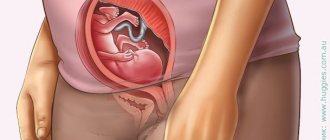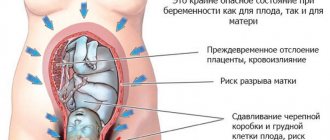So, the “equator” of pregnancy has already been passed, the fifth obstetric month is ending. The 21st week of pregnancy is approaching - the beginning of a calm and favorable sixth month. Now is the most fertile time for mom, since normally her health should be excellent. The baby continues to grow actively, but the growth rate is no longer as fast as in the first half of gestation.
For a woman, the 21st obstetric week of pregnancy is unlikely to be very different from the previous one. The only difference may be a sharp weight gain, but there is nothing strange in this, the child continues to grow, and not only in length, the baby begins to develop adipose tissue.
Often, pregnant women at this stage note an increase in appetite. You don’t need to severely limit yourself in food, but you should choose healthy dishes rather than buns and cakes.
Well-being
Pregnancy at 21 weeks is the “opening” of the final half of the gestation period. Normally, expectant mothers should look great and feel great. The tummy is already noticeably protruding, but so far it is not so heavy as to cause discomfort.
Various unpleasant sensations may occur from time to time, but they should not be constant and intense. Let's figure out what happens at 21 weeks of pregnancy.
Movements
At the 21st week of pregnancy, almost all mothers already feel the movements of the unborn baby. It should be noted that the fetus begins to actively move much earlier, the mother simply cannot feel it. There is no exact time when a woman will be able to feel the kicks of her baby for the first time; in this matter, everything is very individual.
Some especially sensitive mothers begin to feel tremors as early as 16 weeks, while others experience this unforgettable feeling only at 21-22. Women who have already had children, as a rule, begin to feel the first tremors earlier than those who are carrying their first pregnancy.
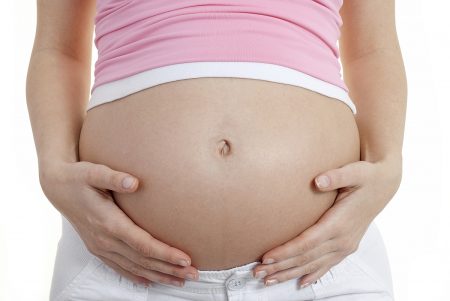
Some mothers are very worried and ask: “What should I do if I’m twenty weeks pregnant and I can’t feel the baby moving?” There is no need to panic, but you should definitely inform your doctor about this.
If, after an ultrasound scan at 21 weeks of pregnancy, the doctor confirms that the baby is developing normally, then there is no need to worry. You just need to wait a little, and you will definitely experience that delightful feeling when the baby kicks in your tummy.
Normally, during this period there should be about 10 movements per day. Women may notice that their baby often becomes active under certain circumstances. For example, when mom goes to bed in the evening.
It has been noticed that the mother’s mood is often transmitted to the baby. If a woman is cheerful and active, then the baby moves more often, and sometimes the baby’s kicks are a real “cry for help.” For example, if a mother spends a long time in a stuffy room with stale air, the baby may begin to push more actively, signaling that he does not have enough oxygen.
A fetus at 21 weeks of gestation can already hear sounds perfectly, so mom and dad can start talking to their offspring. Let him get used to the voices of his parents. It is very useful for pregnant women to listen to melodic, calm music; you can sing lullabies to the baby.
Uterus
The uterus continues to grow; during the period described, it already rises about 1 cm above the navel. Due to the growth of the uterus, other organs are compressed, which can cause some discomfort.
Thus, the raised uterus begins to support the lungs, which can lead to shortness of breath. Therefore, the 21st week of pregnancy is a great time to start doing breathing exercises. Don't waste your time on this! The breathing techniques you master will greatly help you during childbirth.

Stomach
The belly at 21 weeks of pregnancy cannot be hidden from others; it becomes obvious to everyone that the woman is pregnant. The volume of the abdomen at this stage and its shape depend on many factors.
In women who are pregnant for the first time, the abdomen is usually sharp, shaped like an egg. In repeat pregnant women, the volume of the abdomen may be larger and it may be more rounded, “blurry”.
In addition, the size of the abdomen is influenced by the amount of amniotic fluid, as well as by the fact whether there is one baby or two. With multiple pregnancies, the size of the abdomen will naturally be larger. So, 21 weeks of pregnancy with twins is already quite a difficult time, because the stomach has an impressive volume, and the activity of two babies can cause discomfort for the mother.
Condition of the expectant mother at 21 weeks
You are still in excellent shape, so unbearable fatigue and shortness of breath when walking up the stairs may not be a problem for you yet. By the 21st week of pregnancy, your initial weight has increased by about 4-6 kg.
The child begins to grow adipose tissue. So try to be especially careful about what you consume. You can discuss the diet menu for pregnant women with your doctor. Take the vitamins prescribed by your doctor, eat cottage cheese, fruits and vegetables. This all contributes to the proper development of the baby, and also helps the body cope with the load placed on it during this wonderful period.
After all, carrying a healthy baby is a difficult test for every mother.
Symptoms and features of pregnancy
Associated symptoms at 21 weeks of pregnancy may be as follows:
- Breast enlargement and the appearance of colostrum. During pregnancy, the breasts become slightly larger in preparation for the upcoming lactation period. The nipples stand out even more and become sensitive. Gaining more than normal weight can lead to stretch marks on your chest in the future. For most pregnant women, at the 21st week of pregnancy, small drops of colostrum may begin to be released from the nipples when pressed. Colostrum is a yellowish, thick liquid that is the prototype of breast milk. The release of colostrum can begin either at 20-22 weeks or immediately before birth. In both cases, this is not considered a pathology. If there is heavy discharge, you can put breast pads or special napkins in your bra or underwear to prevent the discharge from staining your underwear and clothes;
- Increase in the size of the uterus. What happens to the uterus at 21 weeks of pregnancy? The uterus is already located approximately 1 cm above the navel, and the height of its bottom from the pubis reaches approximately 21 cm;
- Discharge. Vaginal discharge during pregnancy should not be much different from normal. They can only become a little more abundant (this is due to the effect of the hormone progesterone on the mucous membrane). Normal discharge from a healthy woman during pregnancy is translucent or gray-white with a sour odor. If you notice flaky, purulent, cheesy, or strong-smelling discharge, this may indicate a pathology. Watery or bloody discharge accompanied by pain in the abdomen and lower back can lead to miscarriage! Call an ambulance as quickly as possible to avoid harm to the baby;
- Increased hair and nail growth. Due to hormonal changes occurring in a woman’s body, hair and nails may begin to grow faster. The most unpleasant thing about this is that hairs often grow especially actively in undesirable places.
Anxiety and well-being of a pregnant woman
Typically, the twenty-first obstetric week of pregnancy is considered a quiet period. However, all kinds of pain can make it more difficult for a woman to cope with it. Barely noticeable pain in the uterus may be Braxton Hicks contractions, but don't worry, they pose no threat to the baby or you.
Want something interesting? A pregnant woman may also be concerned about:
- Heartburn. Some expectant mothers may experience discomfort from heartburn. The reason for its appearance is that the enlarged uterus puts pressure on the stomach. It lifts the stomach upward, which leads to the reflux of acidic contents into the esophagus, thereby causing discomfort. To avoid it, experts advise not to eat fried, sour, pickled and smoked foods. You should also avoid sour fruits and drinks, and carbonated water. It is advisable not to bend over immediately after eating. Before going to bed, to save yourself from heartburn, you can put another pillow under your head. If relief does not occur, be sure to tell your doctor;
- Dyspnea. The uterus, constantly increasing in size and volume, begins to compress the internal organs, lifting the diaphragm. Therefore, a pregnant woman may periodically experience shortness of breath. To cope with this unpleasant feeling, doctors recommend starting to master breathing techniques. The ability to breathe correctly will be very useful, especially during childbirth;
- Constipation and bloating. Bloating and constipation often accompany a woman throughout pregnancy. This happens because almost all of a woman’s internal organs are under pressure from the weight of the uterus and child. To get rid of constipation, eat more fresh vegetables and fruits that contain fiber;
- Painful sensations. At this time, sitting for a long time in one position can be fraught with pain in the back and lower back. To get rid of them, you can try simply changing your position. Learn to listen to your body and relax. Excess weight during pregnancy can cause pain in your leg joints, back, and muscles. Under pressure from the uterus, pain and discomfort may appear in the navel area. But if there is a cramping pain or a pronounced stretching pain in the lumbar region, then this should not be ignored! To promptly diagnose increased uterine tone, consult a doctor as soon as possible;
- Sleep disorders. Firstly, a fetus at 21 weeks of gestation may interfere with sleep at night due to excessive activity in the tummy. Secondly, the lack of proper sleep may be due to strong pressure from the uterus on the bladder. That is why the expectant mother has to wake up many times during the night to go to the toilet. Thirdly, due to changes in the size of your tummy, it is not easy to immediately get used to sleeping on your side (especially if you previously preferred to sleep on your stomach or back). Therefore, you need to choose the optimal comfortable sleeping position for yourself. Several pillows, or special pillows for pregnant women, can help with this. A bagel-shaped pillow is a very good thing: it is comfortable to sleep with during pregnancy, and after childbirth it can be used to feed the baby. And don’t forget to ventilate the room before going to bed and during the day.
How is the baby doing?
We figured out what the expectant mother feels at 21 weeks of pregnancy, and what happens to the baby during the same period of time we will tell below. Starting from the last (twentieth) week, the baby’s growth begins to be measured differently.
If up to this point the distance from the tailbone to the crown of the head was measured, now the full height is measured - to the heels. At 21 weeks, the body length of the unborn baby is 25-27 cm, and the weight of the fetus by this moment should be 350-400 grams.
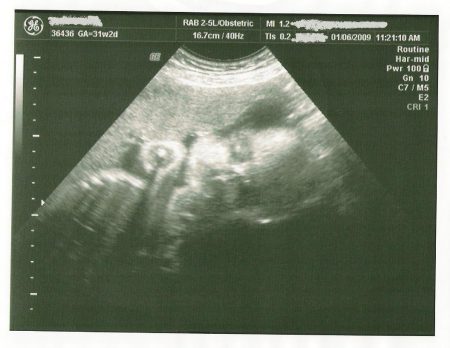
From this time on, the baby will grow a little slower in length, but the child’s weight will begin to increase significantly, as he begins to actively “put on fat,” that is, he begins to develop a layer of subcutaneous fat.
The further formation of the digestive system continues and the baby is already beginning to “use” it. He swallows amniotic fluid, thus “training” the esophagus. Some substances (sugar, water) contained in the amniotic fluid are absorbed by the child’s body on its own.
Mothers should know that the taste of amniotic fluid is affected by its diet. For example, if the mother has a sweet tooth, then the child will receive a lot of sugar, which is not very healthy.
The baby's body is already beginning to produce digestive enzymes that help him absorb nutrients obtained from the amniotic fluid. But so far these enzymes are produced in very small quantities.
At 21 weeks of pregnancy, the size of the fetus still allows it to move freely, perform somersaults and flips. Thanks to this, the muscles are strengthened, and the child controls his body more and more confidently, making various movements.
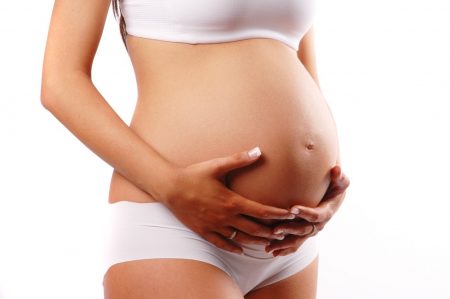
Thus, the development of the fetus at the 21st week of pregnancy is characterized by further improvement of already fully formed organs and systems. His endocrine system is already actively working; the following glands, although not yet fully perform their functions:
- pancreas;
- pituitary;
- adrenal glands;
- thyroid;
- sexual
The spleen also comes into play. The development of the central nervous system continues, the baby has already developed a regime for himself in which periods of sleep are replaced by periods of wakefulness. In addition, the following changes are noted at this time:
- taste buds are formed on the surface of the tongue, so the baby can already distinguish the taste of amniotic fluid;
- the baby’s own leukocytes appear in the blood - cells that protect the body from infections;
- the kidneys and urinary system continue to improve;
- meconium is formed - sterile original feces.
Fetal development at 21 weeks: highlights
| Fetal development parameters | Approximate indicators of the norm (at this time) |
| Height | 26.7-28 cm |
| Weight | 360-400 g |
| Number of movements per day | ~200 times |
21 obstetric weeks is only the 19th embryonic week. At this stage, the fetus is actively growing and gaining weight; these are its two main tasks. Now the unborn baby looks like a miniature man, the length of the fetus from head to toe is 27 cm, and its weight is approximately 380 g. According to medical standards, by the beginning of the next 22 weeks of pregnancy, the child in the womb already has a chance of surviving premature birth .

What does a baby eat at 21 weeks of pregnancy?
By the sixth month, the placenta is formed - the organ through which oxygen and nutrients flow from mother to baby. Metabolic products used by the fetal body also exit through the placenta. In addition, this special organ produces hormones and does not allow substances that could harm it (for example, infectious agents) to reach the baby.
Using ultrasound, the doctor monitors the condition of the placenta, namely:
- its thickness;
- location;
- dimensions;
- degree of maturity, etc.
Important! The development and condition of the baby depends on how the placenta works. Its appearance and structural features can show how the baby is growing and what awaits him before the end of pregnancy.
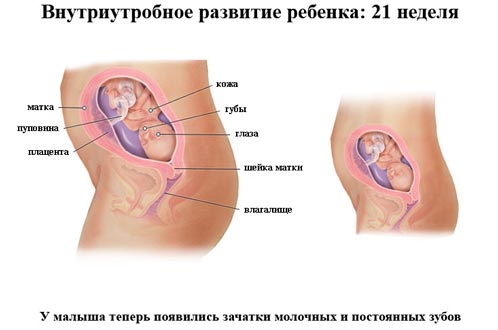
What happens to the baby in the sixth month of pregnancy?
A) Appearance of light fuzz on the head
At about 20-21 weeks, small hairs begin to cover the surface of the scalp, and eyelashes and eyebrows also form.
B) Development of the motor system
The fetus still makes chaotic movements, but is increasingly learning to control them. The phases of sleep this week alternate with phases of activity, the number of which can reach 12-15 per day.
B) Ingestion of amniotic fluid
The tiny baby in the uterus gradually masters sucking movements and trains the muscles of the mouth, drinking up to 500 ml of amniotic fluid per day. At the same time, the work of the most important systems of the fetal body is stimulated: digestive and urinary.
D) Lung maturation
In the event of a sudden departure from the mother's womb, the first thing the child will need to live is the ability to breathe with his lungs. From this point on, brain signals instruct the fetus to practice movements with the cage pile (raising and lowering).
The main changes in fetal development at this stage:
- the child’s skin is no longer thin and transparent, the formation of subcutaneous fat begins;
- the baby’s taste buds begin to work - the fetus is already able to distinguish between sweet and bitter tastes;
- ingested amniotic fluid stimulates the development of the gastrointestinal tract, meconium (original feces) is formed;
- the fetal immune system is improving; leukocytes generated in blood cells can now fight infections;
- in the second trimester, the rudiments of baby teeth begin to form;
- the brain develops at an accelerated pace;
- the endings of the nervous system are improved;
- The endocrine glands begin to do their job.
All about 21 weeks of pregnancy (video):
Surveys
In a normal pregnancy, additional tests are not required at this stage; only an ultrasound can be prescribed at 21 weeks, if the mother did not undergo it a week earlier.
An ultrasound performed at the 21st week of pregnancy will most likely provide an answer to the question that concerns all parents: who will be born to them in a few months - a son or a daughter. But, of course, the examination is not ordered to satisfy the understandable curiosity of parents.
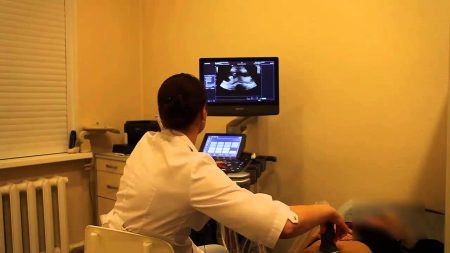
During an ultrasound, the doctor determines:
- head dimensions - circumference, distance between the temporal bones, length of the line from the forehead to the back of the head;
- tummy circumference;
- size of limb bones;
- condition of internal organs;
- heartbeat;
- condition of the placenta,
- volume of amniotic fluid.
Tests and ultrasound
By the 21st week of pregnancy, the results of a triple test will be known, identifying the risk of chromosomal abnormalities and hereditary diseases. If they turn out to be positive or doubtful, additional examination will be needed: a repeat blood test, invasive methods, for example, amniotic fluid sampling.
A woman should visit a gynecologist at least 1-2 times a month. Before this, you need to take a general urine test. The doctor monitors the development of the fetus and changes in the mother's condition by measuring indicators such as the baby's heartbeat, the mother's blood pressure and weight, the height of the uterine fundus and the volume of the abdomen.
Analyzes
If a woman took tests last week, then at 21 weeks, as a rule, she will need to get the result. The results of screening examinations are assessed using special programs. The assessment takes into account the individual characteristics of the woman - weight, age, presence of chronic diseases, etc.
The results obtained are not a diagnosis, but the degree of risk of developing pathologies in the fetus. If the value is 1 in 350 or lower, then there is not much concern, the risk is very low. If you receive disappointing results (1 in 250 and below), you should not panic.
This result suggests that the risk of having a baby with pathologies is one case in 250. Therefore, calmly follow all the necessary doctor’s orders, attend consultations with specialists (if required) and hope for the best.
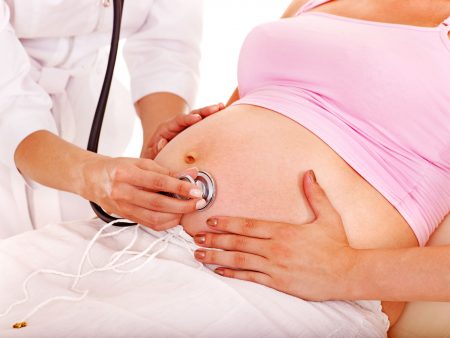
Possible complications
Many expectant mothers experience an increase in appetite during this period, which can lead to excess weight gain. Overeating and the resulting obesity will not only ruin your figure, but can also harm the health of the woman and the unborn baby.
Obesity can contribute to the development of metabolic disorders and even diabetes. Therefore, you need to monitor your diet and weight. On average, at this stage a woman should weigh 5-6 kg more than before pregnancy, and the increase during this week of pregnancy should not exceed 350 grams.
The calorie content of the diet should be in the range of 2700-3000 kcal, and the main part of the diet should be protein foods and complex carbohydrates, but the amount of sweets and baked goods should be reduced. Large portions should be avoided; it is better to eat small meals 6-7 times a day than to eat 2-3 times a day, but in large portions.
It is necessary to monitor not only the caloric content, but also the composition of the diet; it must contain a sufficient amount of vitamins and minerals. In some cases, your doctor may recommend taking vitamin tablets. During this period, deficiency of vitamin D and calcium is especially dangerous.
Discharge
Normal discharge at 21 weeks of pregnancy is colorless, homogeneous, and looks like egg white. If they turn yellow or grains appear in them, you should visit a gynecologist and take a smear. Expectant mothers are often worried about thrush; this disease must be cured before birth so as not to expose the fetus to infection.
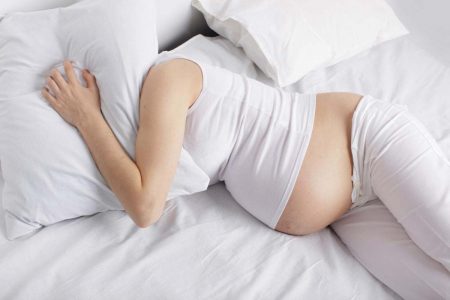
A dangerous symptom may be the appearance of bloody discharge. This may indicate an incipient miscarriage. At week 21, the risk of miscarriage is low, but it is not excluded, so you need to try to avoid overstrain, both physical and emotional. The risk of miscarriage increases if a woman:
- smokes;
- drinks alcohol;
- takes medications without a doctor's prescription;
- drinks too much coffee (5 cups a day or more);
- has a pathology of the uterus (saddle form, fibroids, etc.);
- suffered an infectious disease at an early stage (chlamydia, rubella, etc.);
- I already had a history of late-term miscarriages.
The risk of late-term miscarriage increases with the mother's age, so pregnant women aged 35+ need to be especially careful.
Women who keep a personal pregnancy calendar, as a rule, mark 21 weeks as a relatively safe and calm period. Your health should be normal and routine examinations should already have been completed. Now you can calmly enjoy your condition and even “communicate” with the baby, who is increasingly making itself known with persistent pushes.
Fetus
The baby's eyes gradually open slightly, he hears his mother well. The baby still remains thin, but is already beginning to gain weight. His body is covered with lubricant and original fluff. Often, the fetus moves actively at 21 weeks of pregnancy, and the mother feels movements in the lower abdomen.
The position of the fetus may change - there is a lot of amniotic fluid, and the baby feels spacious. The child sleeps about 20 hours a day and even dreams.
The baby continues to accumulate fats for muscle development and weight gain, which is why the expectant mother is so hungry during this period.
At 21 weeks of pregnancy, the baby’s digestive system improves: part of the food is absorbed by the body, and the other part passes into the rectum. The work of the intestines is facilitated by enzymes and hydrochloric acid, which are produced in the body in small quantities.
Muscle and bone tissue continue to strengthen. The endocrine glands are working fully, and the spleen has recently started working. The production of white blood cells responsible for suppressing infections occurs. Improves bone marrow. The size of the fetus at 21 weeks of gestation is already 26 cm.
The taste buds on the baby's tongue are almost developed, and very soon the baby will fully appreciate the taste of amniotic fluid. The placental layer gradually thickens, at 21 weeks it is 22.81 cm. The baby’s heartbeat is now listened to using a small tube called a stethoscope.
